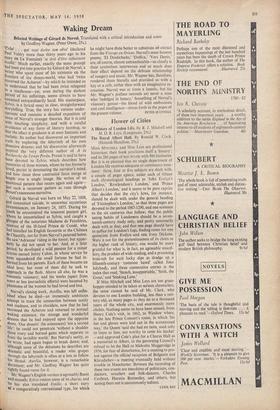Waking Dream
Selected Writings of Gerard de Nerval. Translated with a critical introduction and notes by Geoffrey Wagner. (Peter Owen, 25s.)
pelui . . . qui veut ecrire son reve' (declared Patll Valdry more than thirty years ago in his essaY on La Fontaine) `se doit d'être infiniment eveille.' Much earlier, exactly the same precept had been put into practice by Gerard de Nerval, a Writer who spent most of his existence on the frontiers of the dream-world, who had 'twice traversed the Acheron'—by which he intended us to understand that he had been twice relegated to a madhouse—yet, even during the darkest period of his sufferings, seems always to have remained extraordinarily lucid. His masterpiece, Sylvie, is a lyrical essay in clear, straightforward storytelling. True, the story has curious under- currents and contains a detailed exposition of some of Nerval's stranger theories. But it is,told With touching simplicity, and with a careful avoidance of any form of literary humbug, so that the effect it produces is at once fantastic and realistic. Its author had discovered an important truth by exploring the labyrinth of his own obsessive dreams; and his discoveries afterwards inspired the very different author of A la Recherche du Temps Perdu. Proust is said to have been devoted to Sylvie, which describes how
• Memories of three women, whom he has formerly
• loved, persist in dominating the narrator's mind, and how those three contrasted faces merge at length into a single image. He writes of an eMotional pattern that recurs again and again— just such a recurrent pattern as runs through Proust's enormous narrative.
Gerard de Nerval was born on May 22, 1808, and committed suicide, in somewhat mysterious circumstances, on January 24, 1855. During his Youth he encountered the innocent peasant girl, Whom he immortalised as Sylvie, and caught a glimpse of the notorious Madame de FeuchCres, mistress of the ill-fated Prince de Conde, who had installed his English favourite at the Château de Chantilly, not far from Nerval's paternal home. He saw 'Adrienne' riding in the forest; but appar- ently he did not speak to her. And, at a later Period, he developed a wild passion for a minor actress, named Jenny Colon, in whose service he soon squandered the small fortune he had in- - herited from his parents. Each of these became an ideal love; but none of them did he seek to approach in the flesh. Above all else, he was a romantic visionary; and his works (apart from more or less journalistic efforts) were haunted by Phantoms of the women he had loved and lost.
Nerval's closing work, Aurelia, was left unfin- ished when he died—an immensely ambitious attempt to trace the connection between sanity and madness, and to elucidate, now that he had recrossed the Acheron and returned to normal Waking existence, the strange and wonderful dreams that he had enjoyed upon the opposite Shore. 'Our dreams' (he announces) 'are a second life; he could not penetrate 'without a shudder those ivory and horned gates which separate us from the invisible world.' But Nerval's sanity, as he wrote, had again begun to break down; and, although some of the delusions he describes are dramatic and beautiful, a reader who gropes through the labyrinth is often at a loss to follow his thread. Aurelia, however, is a remarkable document; and Mr. Geoffrey Wagner has quite rightly found room for it.
Mr. Wagner's English version is agreeably fluent and smooth; Sylvie retains some of its charm; and he has also translated Emilie, a •short story of a comparatively conventional type, for which
•
he might have done better to substitute an extract from the Voyage en Orient. Nerval's most famous poems, 'El Desdichado,"Delfica,"Vers Dores,' are, of course, almost untranslatable—so closely is their symbolism interwoven and so much does their effect depend on the delicate relationship of imagery and music. Mr. Wagner has, therefore, rendered them literally and provided us with a key or a crib, rather than with an imaginative re- creation. Nerval. was at times a lunatic, but (as Mr. Wagner's preface reminds us) never a man who 'indulged in lunacy.' Something of Nerval's visionary genius—his blend of wild enthusiasm and cool intelligence—shines forth in the pages of


































 Previous page
Previous page